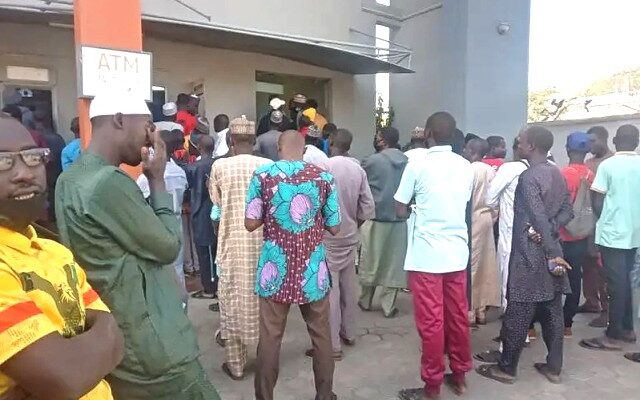A lack of cash has prevented Nigerians from purchasing the things they need, thanks to the government’s efforts to replace its paper money with newly generated currency notes.
Since millions of Nigerians are unable to access their savings, anger over cash shortages has gotten greater throughout the country.
Thousands of households are suffering due to a lack of cash, even as many have run out of essential supplies. The pains range from the agony of a failed electronic money transfer to the agony of waiting interminably in line to use an Automated Teller Machine (ATM).
The traditional cash stations (bank tellers) have stopped operating in the midst of such difficulty because they are out of both old and new currency to disburse.
Given the growing demand for cash, the supply of banknotes seems to be a drop in the ocean. Customers keep flooding banking halls in search of scarce cash after using up the old notes they have in their possession.
Many have turned to Point of Sale (PoS) operators, who have raised their prices by as much as 10%, after all other choices have been entirely exhausted. Sadly, they can only cover a very small percentage of the monetary demand.
Most often, PoS withdrawals are limited to N2,000 per person. Prior to now, PoS operators charged an average of N200 for a N10,000 withdrawal. Even though N10,000 is a large withdrawal, as of yesterday, it cost roughly N1,000.
Withdrawals made through a PoS do not fall under the de facto new cash restriction. Some Lagos ATMs only allowed N2,000 third-party withdrawals, but it now seems that N5,000 is the highest limit.
Small businesses are starting to feel the effects of the strain. Additionally, some businesses are delaying the implementation of electronic payments or placing strange conditions on customers as a result of the rise in unsuccessful electronic transfers.
Some business owners are launching registers for personal information (phone numbers and residential addresses) of clients who want to use alternative payment channels after being defrauded by unsuccessful transactions in the past.
Bank customer service representatives are also battling a backlog of complaints from clients about unsuccessful electronic transactions. Most of the complaints are in relation to unsuccessful transfers that have gone days without being reversed.
If the difficulties persist, there are worries that the inflexible payment system may have detrimental effects on business performance and productivity.
Millions of Nigerians have used social media to express their rage and dissatisfaction while demanding that the policy be reviewed right away. The CBN Governor, Godwin Emefiele, who yesterday appeared before the House of Representatives to defend the policy, has also been urged by a section of the social media protesters to take swift action to salvage the economy and bring back sanity to the monetary system.
The new naira notes are allegedly being hoarded by commercial banks and their employees in an effort to undermine the currency swap scheme, according to a coalition of civil society organizations (CSOs).
The Coalition of Civil Society on Good Governance (CCSGG), led by its President, Bassey Etuk, claimed during a demonstration in Lagos that saboteurs are putting a lot of effort into derailing the entire process.
“While the generality of the people embrace the policy, we are shocked to note that the ruling class and a section of the country are opposing it and fighting it shamelessly without an iota of patriotism for the country,” Etuk said.
Additionally, yesterday, Oba Olu Falae, a former Secretary to the Government of the Federation (SGF) and Minister of Finance, criticized the timing of both the old notes’ removal from circulation and the introduction of the new ones.
He said: “The timing could have been better. Being so close to the election, it’s rather disruptive because people would be moving around. The scarcity of funds may disrupt those movements. The timing could have been better and the organisation could have been better too.”


